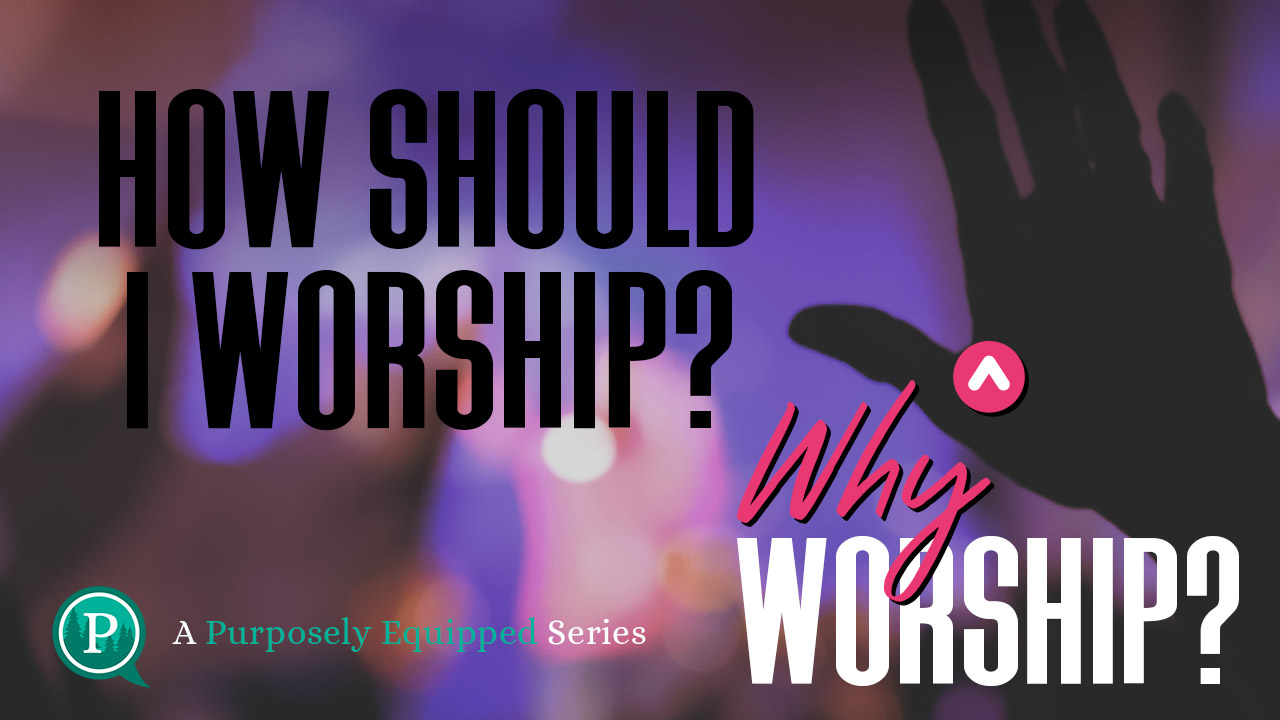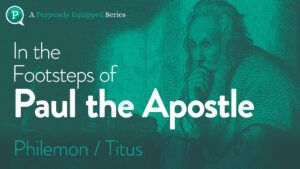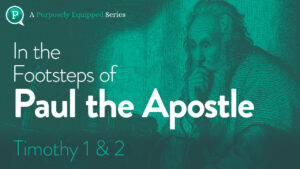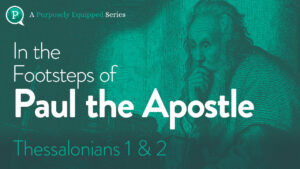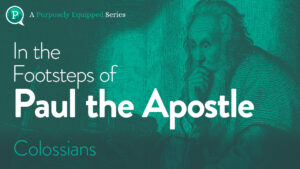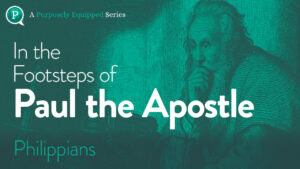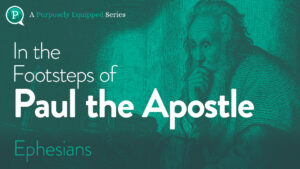How should we worship? What does the Bible have to say about it? Canyon Hills Community Church dives into this today!
Show Notes:
Find Canyon Hills Worship: Online | Instagram | Facebook | Spotify | YouTube
Transcription:
Purposely; Your life, God’s Purpose. Listen at onpurposely.com.
Kobe: True worship, Biblical worship, is supposed to be a combination of those two.
Michael: It’s yes and yes.
Kobe: It’s a holistic experience. We are holistic people who experience everything, mind emotion, will, physically, mentally, spiritually, all those things. Our experience with worship shouldn’t be missing any of those elements…
Chelsea: Or void of either one of those.
Kobe: Right? Yeah.
Narrator: Welcome to Purposely Equipped. We want to help you go deeper in your faith by learning truth from the Bible. Our new series, Why Worship, will help us discover what the Bible has to say about the importance of worship in building a relationship with Jesus. Canyon Hills Worship will be joining us for this five-part series. No matter where you are on your journey, this is a topic that can greatly impact your walk with the Lord.
Kobe: Alright, welcome. My name is Kobe with Canyon Hills Worship. Here with Michael and with Chelsea. And today,
Michael: what’s up?
Kobe: We are very excited to talk about the topic, how do we worship? So, it’s interesting. I, I feel like worship is one of those kinds of strange beasts. I’ve been in ministry leading worship now for like 25’ish years, I think, if I do some quick math and worship is the one area of ministry that seems every person has an opinion on. And every person feels. Qualified and obligated to share that opinion
Chelsea: and that their opinion is the most accurate and right opinion.
Kobe: But the interesting thing is what that has brought to light over those years is that worship is this highly individualized experience. Everyone has kind of their own way,
Michael: Well, it’s so personal.
Kobe: But is it? And I think that’s the question for… it is personal, but I think the kind of the question for today is, we’re talking through how we worship is there’s certainly an individual aspect to it. Are there biblical frameworks? Are there biblical mandates for how we are to worship that are supposed to transcend preference?
But before we do any of that Chelsea, so last time we asked Michael a couple questions. I would just love for people to know a little bit more about who you are, what brought you here, how you got to this place leading worship, and what’s the most embarrassing thing that’s happened to you on a platform?
Michael: What makes Chelsea, Chelsea?
Chelsea: Yeah. Okay.
Kobe: Let, But you gotta do it in like four minutes cuz we got really candid here last week.
Chelsea: I can do it in four, I think. We’ll, we’ll see. Yeah. So, I’ve been at Canyon House for seven years leading worship, which is just wild to me. I think I’m only, Yes. So old. So wise and mature, you know…
Kobe: and humble, which is so great.
Chelsea: I’m really kidding. Yeah. Even being here is just wild to me. Like, The grace of God that I’m here. Cuz when I first showed up here, I was not ready to be doing this. So, the grace of God and you and our other boss Dave, taken a chance on me.
Kobe: But it’s all the mercy of Jesus.
Chelsea: Yes, it’s true,
Michael: extreme mercy of Jesus.
Chelsea: Oh my gosh.
Kobe: If that title sounds interesting, you should Spotify mercy of Jesus. Just kidding.
Chelsea: But how I got into worship, So, I grew up in a like strong Christian home. My dad is a children’s pastor. Shout out Steve Mason. He’s still doing that, but I grew up like in ministry constantly just like, in the church and serving in the church. And in middle school I started getting plugged in with kids’ worship, which is a very different world of worship, and yet one that really just still like so sweet and dear to me. So, it’s obviously all the like, Hand motions and jumping around and all that stuff. That is how I kind of got into worship. I led kids worship for all of my middle school and high school years. Went off to college, kind of pursued music a little bit differently, took a break from everything and then kind of came back into worship ministry. Thought it was gonna be something I’d just do on the side and was pursuing another degree, and the Lord kind of redirected my path and opened up the door to come down here to Canyon Hills and start serving alongside you guys.
Kobe: But we had to talk you out of like a Disney internship or something. It was even like you were also going to cruise.
Chelsea: I was headed for, No, I was headed for the Disney College program and that was, Bucket list thing for me.
Michael: Chelsea’s a big Disney girl.
Chelsea: Big Disney girl. Still am.
Michael: She’s got those Mickey Mouse tattooed on her.
Chelsea: I do actually on her wrist.
Kobe: Most people who already hear that think that’s gotta be a joke. It’s not.
Chelsea: No, I do love Disney. So, I was headed there and like that was super hard decision cuz I felt like, I had this bucket list thing that I was gonna maybe do, but then worship was something I felt like worship leading was something I knew I was feeling the pull towards and the call from the Lord. And I remember like making that decision. Like standing in the like field next to our house with my dad and I was like, Crying and I was like, I don’t know which decision to make, like which one’s the right one? He’s like, I’m not gonna tell you which one’s the right one. But ultimately dropped the Disney College program and came here to Canyon Hills and have been here for, I think this is seven years on staff. We started at the same time. But you were, Michael, you were already here. I think you and Hannah were like my first friends here.
Michael: And best friends.
Chelsea: Yeah. And honestly best friends. Yeah. But yeah, that was kind of my journey back into worship ministry and now doing it full time and confident that like, this is what the Lord is calling me to do right now. And thankful I didn’t go the route of Disneyland, even though that I’m sure it would’ve been fun. I’m just confident that this. Where the Lord wants me And with all of you. And serving and, yeah, leading the church in this way. So, Oh, and I
Kobe: remember not that long ago when we were talking, you said you could do this in less than four minutes.
Chelsea: I know. Okay. You guys chimed in.
Kobe: That’s okay. But very, so funniest. Funniest story. Most embarrassing thing. And then we’ll get on
Chelsea: This will be quick. Early on in my time here, I would say I’ve grown vocally a lot in the past seven years, probably more than any other time in my life, but when I first started here, I was still like, I don’t know, it was just intense. It was a lot here. I was nervous, whatever. Still really trying to work out my vocal range and I remember there’s one song and I have not led it since and I don’t think I will cuz it traumatized. We don’t do it anymore. We don’t do it anymore. It was open up to Heaven, you know it. Yeah.
Michael: So, shout out Meredith Andrews.
Chelsea: So, it was, so it was primarily led by a guy, but then there was a part that the girl led, and I hadn’t been leading here a ton yet. Yeah. It was a show us your glory part, and you sing a little bit higher than me. Now it’s probably even out on like Key wise, like what works. But you needed to sing it in a certain key. I think it was like key A D or something, I don’t even know. And I was like, Kobe, I cannot sing that part in this key. And you’re like, No, you’ve got it. Like you had it in rehearsal, it’s fine. I’m like, Yeah, but it wasn’t fun. And I was nervous the whole time we get up to do it in front of the whole church. I’m like bracing myself for that part and I know I don’t have it. And you know who didn’t have it. Me. And my voice was just like cracking and I was just like, could not pull it together. And I was really…
Michael: Do we have a video or like recording with Sure we can, we can plug it.
Chelsea: And I got this, and I just was like, See, I couldn’t do it. And that was like the other, I like
Kobe: What you talking about? Was great. That was so just, Well, the good news is, is if you’ve ever seen Chelsea lead worship, you know that she hides her emotion very well.
Chelsea: Oh. So, well.
Kobe: So, there was no way. All right. Well, on that incredibly deep and spiritual note. Yep. Let’s shift gears. So, how do we worship that is the question. Does the Bible give us any instruction? I guess I’m just thinking of the person who might be listening to this podcast who, again, wants to grow in their worship, wants to grow in just… I keep wanting to come back to knowledge of what it means to be a biblically obedient worshiper. Cause this can’t just be our opinions about what worship should look like, should we choose it. It’s a question of what does the Lord expect from us when it comes to worship? So, I’ll throw that question out there. And then so what do you guys got?
Michael: In spirit and in truth.
Kobe: That’s a great answer. Yes. John 4:24. Yeah, I just googled that. Just kidding. I knew that.
Michael: That was a quick Google.
Kobe: Very quick, real quick. So, Spirit and Truth, while that is true, can we get any more specific than that?
Michael: No.
Kobe: That’s great. Next question.
Michael: Well, I think we are always walking this line in worship music because obviously our whole life should be worship and we are all times worshiping something. But for the purposes of this podcast, we’re talking about worship music. Am I correct in that?
Kobe: Correct. Not necessarily worship music, but corporate worship,
Michael: Corporate worship, worship, , corporate worship in church and spirit and in truth. Like I think, I think it’s important that we don’t ignore either of those things. One, being like the emotion and the spirit side of it and, and, and being led by the Holy Spirit in worship. But then also making sure that us as worship leaders we’re picking songs and writing songs that are also truthful. Like that, just like at that basic level is like so important because I mean, anyone in here who is, who is a worship leader, songwriter, whatever you are, anyone listening to this like, like you, you’ve probably gotten comments from your congregants at your church about lyrics and songs. Confusing lyrics, whatever it might be. Sometimes they might be a correct question or like sometimes they might be I don’t know, a little bit misguided. But it is important that we filtering all of our songs through that, through that lens of, of is this truthful? Is this biblical? Is this really, are we singing about the, the right Jesus? I mean, yeah. Really? Yeah.
Kobe: Are we, are we singing to someone with a similar name, but maybe not be all talking about the same person. I think what you just mentioned, Kind of brings up what are probably two of the major ditches that we can run into when it comes to worship. There’s a group of people that the ditch they run into is worship, is this emotional pursuit. It’s the pursuit of a certain feeling or a certain environment or certain atmosphere. And if those things are accomplished, then that is, if I feel a certain way, then worship has been accomplished. There’s also a lot of people, and this I think is probably more in the conservative side of the church, in which I would say Canyon Hills probably leans more this way, which is, worship is simply ascending to true things. There’s a true lyric on the screen that I can kind of, as long as I’m agreeing with that, that’s the truth piece. That is worship. I think what you’re getting at there, which you think is the right spot, which is true worship, Biblical worship, is supposed to be a combination of those two.
Michael: It’s yes and yes to both.
Kobe: It’s a holistic experience. We are holistic people who experience everything, mind emotion will, physically, mentally, spiritually, all those things, our experience with worship shouldn’t be missing any of those elements of…
Chelsea: Void of like either one of those things. Yeah. I think part of it too is that like we overcomplicate what worship should look like. I think people you talked about already, like people do have so many opinions about what worship should be. What we, what songs we should sing, and while it’s important to like to know where we stand on things and know what we believe, like it’s so simple. Like we can look to scripture and see like, How David worshiped. How, you know, like it’s, I mean, I think that’s where we have to start is like, well, what does scripture say about it? What do we see? Like, how do we see worship taking place both in the Old Testament and New Testament. Like we see so many times where like David talks about just singing to the Lord, like shouting to the Lord with joyful hearts. Like dancing before the Lord. Bowing. Like all these things where it. We overcomplicate it and yet like scripture makes it so simple. Like these are the commands that God has given us. I think about like at…
Kobe: The very least, the examples that God has of like, these are acceptable forms and the unacceptable forms, people are like struck dead.
Chelsea: Yeah. Well and like even, even on that, like I was reading something recently just about like acceptable worship and unacceptable worship, and you see even like so early on in scripture with like Cain & Abel, so they both bring these offerings before the Lord and Abel, like brings the, he brings his best offering. Like he brings the, the first. It’s the, he brings the like fat portions and the first borne of his flock. And then which I’m like, that’s not, like, doesn’t sound lovely, but that, that sounds delicious. But that’s like, he brought the best and then Cain like brings some of the fruits of his soil, but it’s like, Not the best. And the Lord rejects that offering. And it’s like, I think that part of worship is just coming before the Lord with our best. And sometimes that’s gonna be raising our hands. Sometimes that’s gonna be shouting for joy. Sometimes that singing loudly with a congregation, or it might be a mixture of those things, but it’s about bringing like our best, and not just some sort of offering. Because that is what the Lord is looking for, is like an acceptable best offering of worship.
Kobe: Well, I think that’s an interesting piece to, to jump off of because one of the key elements in that is, What are we bringing? I think too many people look at the idea of worship from this consumer mentality of like, Well, I go to this church cuz I like the music, or it’s the song that I like, or it’s whatever. Not enough people, and I’ll, I’ll say that humbly, myself included, go into every worship experience going, All right, Lord, here’s what I’m bringing to you. I don’t see those lyrics on the screen as something that I’m supposed to be taking and offering before the Lord. I see it as something to be experienced and consumed. And I think your point with Cain and Abel, I think even we get to these other like worship the Lord in, in spirit and truth, like it’s a command that we be willing to bring something. So, there’s a hard attitude there that I think just gets skipped over sometimes.
Michael: Yeah. Well, kind of piggybacking on that, like in a different direction. Like honest worship and like, bring me in your best, like, let hear me say like if you. If you’re listening to this, going through a time that is difficult, going through a season of loss. Going through a season of, of pain. Like your worship is gonna look different than someone on the mountain top, and that’s good. And that’s right. And like we see the laments and lamentations and in the Psalms and like, you see like that is worship still. That is worship. And so, don’t feel like if you don’t feel like you’re in the place to be singing a celebration song at the time, because you’re not in a season of celebration, that’s fine. That’s fine. But call to mind what is true. Something that you say a lot that’s kind of become you. I’m pointing to Kobe. I realize this is an audio format.
Kobe: You just look right over there. In that corner.
Michael: Is sometimes we, we sing because we know something is true. Sometimes we sing because we. Until we believe something is true, right? Like sometimes things are a proclamation and sometimes they are a cry for help. And that’s fine. Both those things are good. Yeah. And I think there’s been, and we’ll probably get into this in later podcasts.
Kobe: We are there specifically a podcast coming up on worshiping in times of suffering, right.
Michael: Right. And, and I think both those things are so, they’re so important. So, like, if this is, this is how should I worship? And sometimes it’s gonna look, It will always, Sorry. Not even, sometimes it will always look different for the different people in that congregation. And like as a worship leader, if you’re looking out at your congregation and thinking, Wow, not everyone in this room, and this is something I’ve struggled with, not everyone in this room is dancing around, arms up in the air, celebrating with me. Maybe they’re just not, They’re just not coming with. But there’s people in those room that just got a diagnosis that they don’t have that much longer, or their brother doesn’t have that much longer. And like I’ve known those stories and then looking at those people and seeing how they are still worshiping, but sitting down, praying, maybe in that moment. Maybe being sung over, maybe like it looks, it looks physically different at all different times.
Kobe: So, but I would add to that, I mean, I think that’s a hundred percent true. It does look different, and it should look different. What it’s never devoid of though is the whole person. And I think that’s the thing that I like worship pastor pet peeves the wrong words, but make it sounds like I’m annoyed with people. It’s really more of like sometimes when I look at a congregation concerns. Yeah, well, like a just desire of like, Man, I think you guys are missing out when we’re willing to compartmentalize our worship to simply mental or simply emotional… we’re cheating ourselves out of what worship is meant to be. Because even if you are having kind of that mountaintop, your life’s never been better celebration of the goodness of God, that should still include and involve your mind, your emotion, and your will. When you are suffering, and I’ve watched in the congregation and seen a family whose child just passed away the week before, their mind and their emotion and their will express themselves very differently. But they are a hundred percent present. So, I think, I guess for the purposes of this podcast, it’s, it’s recognizing that it may look different, but for anyone kind of wanting more clarification of how should I worship, I think that’s a, that’s a good way to lay it out. It’s a whole body, whole person offering before the Lord.
Michael: Sacrifice. Sacrifice. Romans 12. It is like, I think that is the best passage on worship because, Our, we are to be a living sacrifice. That is what worship is.
Kobe: Yeah. So, we’re already coming up on our time, which goes by fast. Any kind of thoughts? I mean, I, I have a few things that I wanna share here at the end, but I wanna make room if you guys, if there’s anything else burning in the back of your mind that you’d like to share.
Michael: I shared my piece.
Chelsea: I mean, I think even thinking through the context of when you get a, a group of people together worshiping, you’re gonna have the really expressive people. You’re gonna have the people that are less expressive. And I think one of the things, like I’d say I’m decently expressive, maybe not like, Crazy expressive.
Kobe: Not afraid to march in place.
Chelsea: I like to move around. I like to march a little in place. And I think one of the things that’s been important for me in that of like, I just wanna make sure that my worship is genuine. And like, I think that would be my encouragement no matter where you find yourself in that like, spectrum of people. Cuz neither one is bad, and some people are naturally just gonna be more expressive, and some people are gonna naturally be a little bit more somber. You know that that doesn’t necessarily mean you’re not worshiping at one time or another. But I think the question to always ask yourself is like, where is my heart posture? And am I worshiping genuinely? Because this like this is actually where I’m at, or am I doing it because I’m thinking about the people around me? Which I think can go both ways. Like am I expressive and all over the place because I want people to see me and think I’m like just some really, you know, holy worshiper. Or am I so worried about people that are not doing,
So I think all the time. But or the other end of like being so concerned when you’re in those corporate settings that you’re doing nothing because you’re so worried about people looking at you. And I think it’s that question of like, where’s your heart at? And like just wanting to bring genuine worship before the Lord. And sometimes that’s gonna mean your hands are lifted high and like surrender. That might mean you get done on your knees and like you’re bowing before the Lord. Like we see that in scripture. I was reading, and it’s in multiple places in scripture, but Philippians 2:9-11 says, Therefore God exalted him to the highest place and gave him the name that is above every name. That at the name of Jesus, every knee should bow in heaven and on earth and under the earth. And every tongue acknowledged that Jesus Christ is Lord to the glory of God the Father. And like that’s what’s to come. So, if that’s what scripture is like preparing us for, that someday, like, when Jesus returns, All of creation is gonna bow and confess that he’s Lord. Like, why would we miss out on doing that here and now? And I think that that’s just important too, as we worship, like, make sure that we’re worshiping from that genuine place and, and honestly, taking cues from scripture on like, what did you know, like, what do we see David doing in scripture? What do we see like, the Israelites and different people in scripture, Like, how did we see them worshiping, like follow that lead?
Kobe: Well, I think that’s an interesting, there’s an interesting dichotomy, I think is the right word for it. There’s an interesting dichotomy there because it does have to be genuine, but it also has to be obedient. I keep coming back to that, that issue of obedience because there are things that we’re called to do that we don’t naturally feel like doing, but we still have to learn to put on. So, where I agree, like it can’t be in the absence of genuineness. Like I can think of conversation I had, I had a conversation with a friend where they, you know, they said like, I’m just not, Cause I made the comment. I’m like, You, you, you know, we’re worshiping, and you look kind of like, you’re mad, you know what’s going on? They’re like, Well, I’m just not really that expressive of a person when it comes to worship. And I was like, Interesting, because I’ve watched football with you, and I’ve seen what you do when you get excited about something and what you do in the living room is not what you’re doing on stage. Now, not, not saying that it should be exactly the same, but I am saying
Michael: that was me.
Kobe: Yeah, it was Michael. No, that’s you always look mad. No, but like, that’s not true. But that’s the piece where it’s like there are practices that we have to put on also believing that like, they will become part of ours. Cause I think I’m just, I’ll just read through a couple scriptures here and, and some of this, I’d love to take full credit of this. I’m this just taken from a book called Vertical Church. There’s a chapter on worship that just goes through a couple scriptures that just speak to the different physical manifestations of worship.
Psalm 71:23. My lips will shout for joy when I sing your praises. Psalm 116:1. I love the Lord because he hears my voice. There’s an expectation that when it comes to worship, our voices are going to be used. It doesn’t mean our voices have to be pretty. Doesn’t mean the song has to sound nice, make a joyful noise, not a pretty one, which we’re all grateful for, right? When you look to the eyes. Psalm 123:1, to you. I lift up my eyes to you who are enthroned in the heavens. The head. Psalm 3:3. But you, oh Lord, are a shield about me, my glory and the lifter of my head. The hands Psalm 47:1, Clap your hands all people shout to God with loud songs of joy. Like, we don’t ask people to clap at the end of worship songs because we think the band’s great. We ask them to clap because there’s something about the body participating in a celebration that obviously the Lord seems to value. Psalm 63:4, Lift up your hands in the sanctuary and bless the Lord. Right? The lifting of the hands isn’t just for the uber expressive. There’s a blessing in the Lord… there’s a blessing to the Lord that is given when we participate in that way. Legs, Psalm 95:6, Come let us worship and bow down. Let us kneel before the Lord our God, our maker. So, I, I guess I share all that to say like, I remember I read this article, I can’t remember who was by, but basically making the point, like, worship, dancing in worship is inappropriate. It’s distracting. There’s no, that’s what the article, this is, the article was saying. Okay. And they, they are, and a really well-known author, that I won’t throw into the bus in this moment, but, and he’s much smarter than I am on most things. If we were to talk about it, I would just default to whatever he believed was true, but he was making the point that there is no biblical case to be made for dancing in worship.
And I immediately went to Psalm 149 and 150, both of which call us to dance before the Lord. And there’s no like special outline for this is the kind of dance that has been determined as holy and unto the Lord. It’s like, no, it’s just something that we do, and we dedicate and offer to him. So, I think that offering is the, is the foundation piece. But I think maybe we’ve kind of landed on those, those main bullet points of it’s supposed to be genuine, like you were saying, Chelsea. It has to be an authentic reflection of our hearts before the Lord. But then there’s also this pressing on of obedience, believing that if the Lord’s gonna call us to it or set that example forth in scripture, there’s probably a benefit for us and a blessing for him.
Chelsea: And just the reality too of like, he deserves it. Like he deserves us giving our best. So, for the stone-cold worshipers, like maybe the challenge for you, if you’re listening, maybe they’re not, I don’t know, is that like God deserves more than hands in pockets and like just staring at the screen. He deserves like our best worship. And for those that are really expressive, maybe it’s just that challenge of like making sure that in that expression we are doing it from a genuine place. Our God is worthy of that. Like acceptable, honoring, God glorifying worship.
Kobe: Amen. All right, well thanks for listening to our little conversation here. Next week, we’ll be looking at the topic of worshiping when it’s hard worshiping in seasons of suffering. Worshiping when it doesn’t necessarily feel. Like should be worship a season of worshiping. So hopefully you’ll take a listen and hopefully this is a blessing to you. See you next week.
Narrator: Again, special thanks to our hosts for this series, Canyon Hills Worship. Don’t forget to check out their music on Spotify or Apple Music, or anywhere you listen to music digitally. Thank you for downloading Why Worship; a Purposely Equipped series. Let’s keep growing in our faith together. Purposely Equipped is part of Purposely a podcast network with practical podcasts, to help you find and live in God’s purpose for your life. Find more podcasts and faith resources at onpurposely.com.
Follow this podcast:

